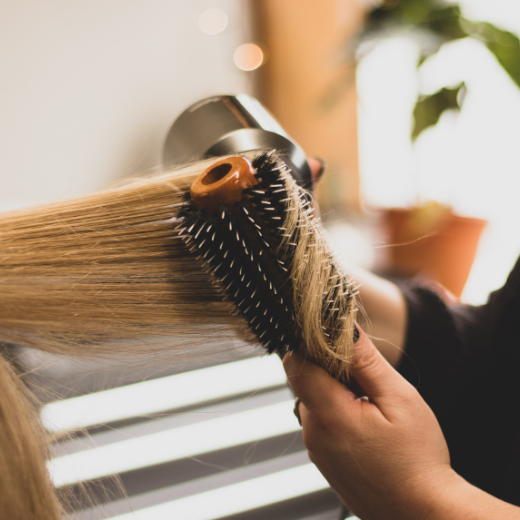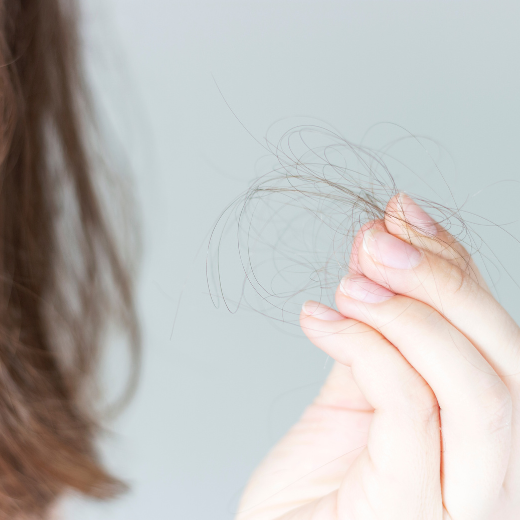Why You’re Losing Your Hair: Common Causes of Hair Loss
Posted by Nikki Wisher on Aug 16th 2024
Hair loss can be a sneaky problem. One day you find yourself saying, “I don’t think I usually lose this much hair when I brush my hair,” another day you ask yourself, “Did that part in my hair always look like that?” and eventually it becomes undeniable that your hair is thinning. If that’s where you find yourself, don’t panic. It happens to more people than you might realize, and depending on what’s causing your hair loss, there are often ways to get your lovely locks back. In honor of Hair Loss Awareness Month this August, we’re breaking down the most common causes of hair loss and what you can do if you hair is thinning.
Top Causes of Hair Loss
Our bodies are incredibly complicated ecosystems and there are so many changes or issues that can create a domino effect where the last domino is your hair falling out. Some causes of hair loss are just cosmetic and harmless while, in other cases, hair loss could be a sign of something happening with your health. Let’s take a look at the most common causes of hair loss.

Male Pattern Baldness or Female Pattern Baldness
The most common cause of hair loss by a long shot is good old-fashioned genetic hair loss, AKA male pattern baldness or female pattern baldness. The clinical term is androgenic alopecia because it’s related to your androgen hormones. For men, this usually causes either a receding hairline or a balding spot at the crown of your head that gradually gets bigger. For women, it usually causes the part in your hair to widen.
This is a bit of good news and bad news. The good news is that if you have genetic hair loss, it doesn’t mean there’s anything wrong with your health, it’s simply a cosmetic change your body goes through. The bad news is that you can’t change your genetics,
Physical or Emotional Stress
When your body is under a lot of strain, it can lead to a condition called telogen effluvium which means your hair falls out. This could be physical stress like an extreme boost in your workout routine or recovering from a significant illness or it could be severe emotional stress like grieving a loss or going through a major life change.
This cause of hair loss is also a good new-bad news situation. The hair loss tends to happen very quickly, which can be heartbreaking (and it can add to the severe stress you’re already under) but it’s typically temporary so your hair will probably recover after you do.
Hormonal Changes
Your hormones can play a major role in your hair loss (and your hair in general), so it’s not a surprise that sudden and significant changes in your hormones can lead to hair loss. This is especially common with pregnancy, childbirth, and menopause (gents, count yourselves lucky, because this type of hair loss most often affects women). Like stress-related hair loss, hair loss from hormonal changes can be rapid but it’s usually temporary.
Hairstyling
Did you know that the way you style your hair could lead to hair loss? Some hairstyles, beautiful as they may be, can put too much strain on your hair. There’s a type of hair loss called traction alopecia which is cause by hairstyles that put too much tension on your hair, like braids and tight ponytails. Hair loss can also come from damaging your hair with certain chemical processes like bleaching or perms. Generally, hair loss from hairstyling happens when you use these styles repeatedly or if chemical processes aren’t done properly.
Medical Conditions
There are actually quite a few types of medical conditions that can cause hair loss. Psoriasis of the scalp or fungal infections on the scalp can both cause hair loss. So can thyroid disease, syphilis, and polycystic ovary syndrome or PCOS. There’s also a specific autoimmune condition, called alopecia areata, which causes your body to attack your hair follicles. That can lead to patchy or complete hair loss throughout your body.
Nutrient Deficiency
Your body needs nutrients to be able to create hair, and if you’re not taking in the nutrients it needs, your hair may thin. Hair loss is particularly common if you’re low on iron, protein, biotin, or zinc.
Medications
Just as some health conditions and illnesses can disrupt the delicate balance in your body and lead to hair loss, some medications can do that too. Chemotherapy might be the most well-known medication that causes hair loss, but there are countless others too.

What Can You Do About Hair Loss?
Okay, enough talk about why you’re losing your hair, let’s talk about some action steps for what you can do about it.
If Possible, Address the Cause
If you’re able to figure out why you’re losing your hair, addressing the cause is often the most effective way to stop the hair loss and give your hair time to regrow and recover. That might mean treating a medical condition, finding a way to relieve your stress, working with your doctor to change your medication, or adjusting how you style your hair, for example.
Keep in mind though that most cases of hair loss are just hereditary, and there’s nothing you can necessarily do about those genetics.
Take Hair Growth Supplements
If the cause of your hair loss is beyond your control, hair health and hair growth supplements can be a helpful option. Nutrafol is a trusted brand that makes several different products for different circumstances and types of hair loss. For example, they have supplements for men and supplements for women to address the hormonal aspects of hair loss, and they even have more specialized products like a supplement for postpartum hair loss.
Use Topical Hair Growth Products
Another way to help stop your hair loss or regrow your hair is through topical products. There are plenty of over-the-counter topical products for hair loss, like hair serums as well as sprays and more.
Visit Your Doctor
If over-the-counter products and supplements aren’t giving you the results you want, your doctor could be able to help. A dermatologist may be able to help you figure out why you’re losing your hair and offer clinical procedures or prescription medications to foster new hair growth.
In any case, Hair Loss Awareness Month this August is the perfect time to boost your knowledge about hair loss and to take steps toward fuller, healthier hair.


